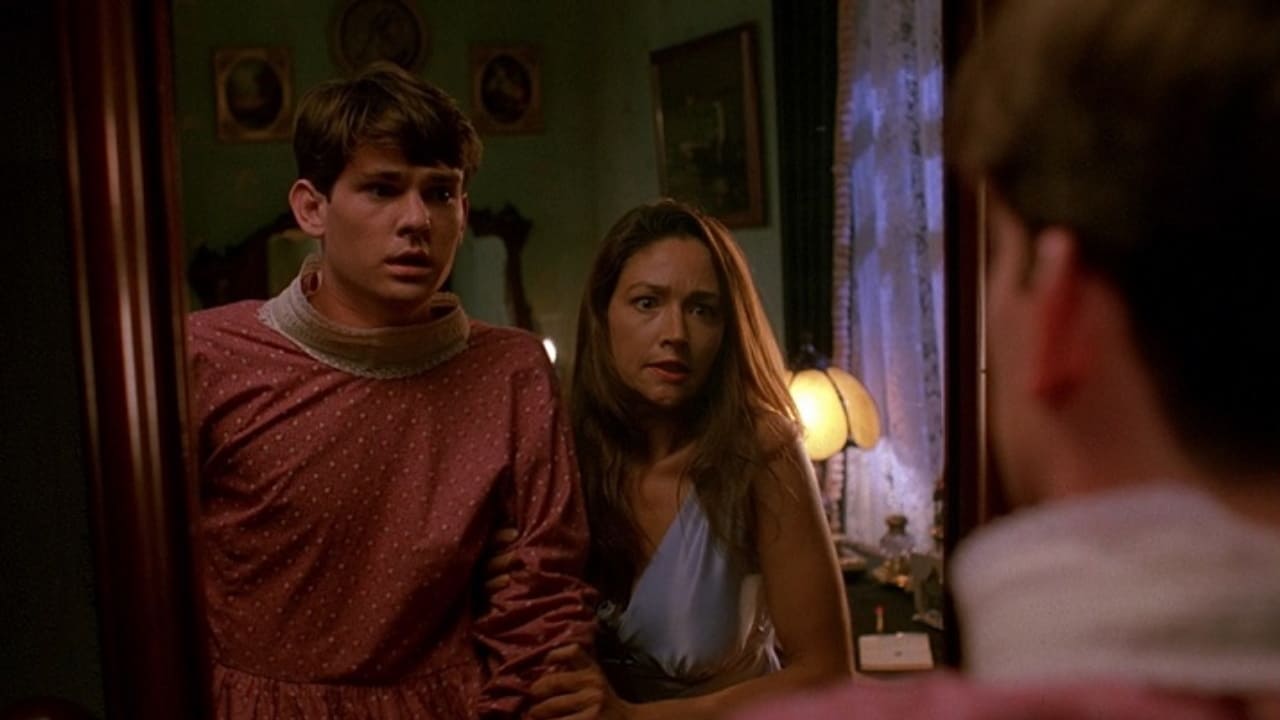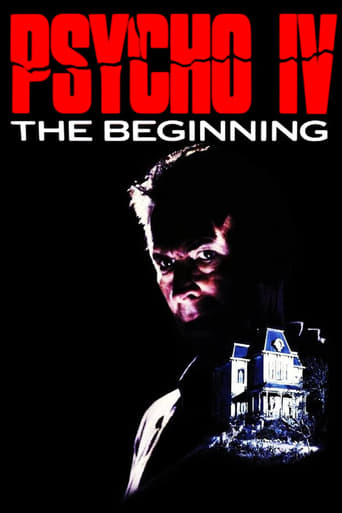

A Brilliant Conflict
... View MoreA bit overrated, but still an amazing film
... View MoreI wanted to like it more than I actually did... But much of the humor totally escaped me and I walked out only mildly impressed.
... View MoreThe film never slows down or bores, plunging from one harrowing sequence to the next.
... View MoreRadio host Fran Ambrose (CCH Pounder) does a show about men who kill their mothers. Norman Bates (Anthony Perkins) calls in as Ed from a seemingly suburban kitchen. His psychiatrist Dr. Richmond is a guest on the show. He recalls various stories from his past. As a young man, Norman (Henry Thomas) kills a girl obeying the delusional voice of his mother. He describes his life with his mother Norma (Olivia Hussey).There are some inconsistencies with the earlier sequels. It's nice to have Perkins back but he is mostly talking on the phone until the last part. Henry Thomas does a nice younger Norman in the flashbacks. The individual vignettes aren't that memorable and neither are the victims. This TV sequel tries to be Hitchcockian. It's better than feared but still not that compelling.
... View MoreNorman Bates (Anthony Perkins) returns for this prequel, once more having mommy trouble. This time around he is invited to share memories of mom (Olivia Hussey) with a radio talk show host (CCH Pounder).Joseph Stefano, the screenwriter of the original film, was brought back to write the fourth film. He had disliked the two films between I and IV, feeling that they were too commercial and catered to the conventions of slasher movies. In an interview, Stefano stated, "Gearing up for Psycho IV, I decided to ignore the two sequels – like the business in II about Norman's mother." I think Stefano had the right idea. Arguably, this is the best sequel to the original film, which is pretty rare for this far into a franchise. There is a solid cast, a fresh new story, and more than adequate direction from Mick Garris. (I don't typically have high praise for Garris, but between this and "Sleepwalkers" he has at least two hits under his belt.)
... View MoreIt is a received idea of film criticism that sequels are (subject to a few recognised exceptions such as "Godfather II") never as good as the original film and that the more sequels a film generates the weaker they will become. The first three episodes in the "Psycho" series seem to bear out this received idea. Alfred Hitchcock's 1960 "Psycho" is, with justification, regarded as one of the great classics of the cinema. Richard Franklin's "Psycho II" is no classic, but it is at least a watchable thriller in its own right. "Psycho III", directed by its star Anthony Perkins, is quite honestly a horrid mess, a film that achieves the difficult feat of being gruesome without being in the least scary. I therefore had no great hopes for "Psycho IV: The Beginning", which was made as a television movie as "Psycho III" had been a financial flop. In the event, I was to be pleasantly surprised. You might have thought that, after the mayhem committed by Norman Bates in the second and third films, he would have been locked up and the key thrown away, and that he would never have been released again, no matter how many psychiatrists could be found to pronounce him sane. It therefore comes as some surprise to see him free at the beginning of this film. The reason is that the scriptwriter Joseph Stefano, who also wrote the screenplay for Hitchcock's original, disliked episodes II and III and, unusually for the writer of the fourth entry in a franchise, felt at liberty to ignore the second and third instalments completely. There is therefore no mention of Norman's supposed aunt Emma Spool or of the crimes Norman committed in those films. Norman's father dies after being stung by bees; he is not murdered by Emma, which is the explanation given for his death in "Psycho II". This film, therefore, should be seen as an alternative sequel to Hitchcock's, not a sequel to "Psycho III". It also serves as a prequel because it contains flashbacks to events which occurred before the events of the original. Another link with Hitchcock's film is the use of the original theme music by Bernard Herrmann. One element Stefano does borrow from earlier episodes is "Norma", the Christian name given to Norman's mother in "Psycho II"; in the original she is simply referred to as "Mrs Bates". The suggestion is that Norman has been named after his mother by receiving a masculine version of her name. This is an unusual way of naming a boy- it is much more common for boys to be named after their fathers or other male relatives- and the similarity between their names may have been intended to symbolise Norman's confusion between his mother and himself. The framework for the film is provided by a radio talk show where the host is discussing the topic of matricide with her guest Dr. Richmond, Norman's former psychologist. Norman calls the show, using an alias to tell his story, which is told in a series of flashbacks. We get to see for the first time how he murdered his mother and her lover, Chet Rudolph. Another plot line concerns Norman's wife Connie, who is pregnant, and his fears that the unborn child will grow up to inherit his madness. One of the weaknesses of "Psycho III" was that there were no acting performances of any real merit other than that from Perkins himself. "Psycho IV" is much better in this respect. We get to see Norma Bates for the first time, and she was not a bit like the woman I had envisaged. After seeing "Psycho" I had always envisaged her as a monstrous old harridan, fiercely narrow-minded and puritanical. The character played by Olivia Hussey (perhaps best-known as Zeffirelli's Juliet) is very different, an attractive but obviously troubled young woman, suffering from some kind of mental illness, possibly schizophrenia. Left widowed at an early age, she is at times a loving and affectionate mother to her only son, but at others can be either over-familiar or cruelly abusive, locking him in a cupboard or forcing him to dress as a girl. She can be prudish where sex is concerned, but can also behave in a seductive way with her boyfriend Chet. Chet himself takes a dislike to Norman, whom he finds insufficiently manly, and takes any opportunity to humiliate him. There is another good performance from Henry Thomas as the young Norman, a sensitive and lonely youngster. His own mental troubles are partly due to his genetic inheritance and partly to his strange upbringing. He is good-looking and attractive to girls, but because of his mental issues finds himself unable to relate to them. Perkins clearly wanted to arouse pity and sympathy for Norman, not merely depict him as an abhorrent monster, and with Thomas's assistance he succeeds in this aim here far better than he did in "Psycho III". In fact, I liked the "prequel" flashbacks more than I did the "sequel" part of the film. The radio phone-in framework struck me as a bit of a gimmick, and the scenes involving Connie are not very memorable. The scenes of Norman's early life, however, are gripping, and I felt that they achieved the rare feat for a sequel of adding something to our understanding of the original film. 6/10
... View MoreI must say, a tormented mind is a terrible thing. For a fourth outing, you could of well expected this one to suck. It doesn't. This is a prequel, where we find out how Norman Bates's hell started. Of course, starring Henry Thomas as a young Norman Bates, wasn't the best of choices, as he really doesn't come off as a psycho. Leave that to the late great Anthony Perkins. Again, after 3, after another indeterminate stint in jail, etc, he's back out in society, and back in that big house at the fore of the infamous Bates motel. His wife, a nurse he must of met at the nuthouse, is expecting, so Norman's thinking what if another Norman pops out. He calls in a radio station, where a woman host (CCH Pounder-Sliver) is talking to a veteran psychiatrist about Matricide- murdering your mother. The guests before were a killer and the victim's father, who supports the killer, as his daughter was, which he referred to as a "World class bitch" which I've met a few of them in my time. On this unreality note, it doesn't despoil this solid drama at all. Norman is venting his killer impulses, threatening to kill again, where we go back and forth to Norman's childhood, (one young girl-a hottie with big, you know who has the hots for him, making the drive to this killer hotel). This is a sexy little chunk of the film, where wee see our young Norman is a bit of hit with the ladies, one much older, telling him during a pash, "You have a tongue like an elephant's memory" before becoming another of the deceased. I had never heard that intriguing term before. Young Norman was physically and mentally abused by his mother, sometimes, performing some degrading tasks and requests, like you hear with the childhood of these real life serial killers. Olivia Hussey is excellent, as the unstable and cruel mother. She has her moments which are scary, as in her change of moods. Things worsen, with the arrival of Mummy's new lover, who teaches young Norman to fight, but he wants no part of it. The flashback use of time is great here, as we really get to see what Norman's unstable environment was like. The movie becomes serious when the host shrink, outs two and two together figuring out the identity of the nutty and distressed caller. Anthony Perkins has still got it, where he never lost it as Norman Bates, and as the film nears the end it becomes a race against time. This fourth outing I think will surprise you. You don't expect it to be this good. It's quite a tense one and the back and forth flow is even Steven. It works, thanks to Hussy chiefly, where really it's not Perkins's movie, as he's not seen that much, only really when holding the line, engaging in his phone conversation, in between his cooking, using that big bad knife of course. The only downfall is the insufficient performance of Thomas, who like I said, really doesn't come off, that psycho, if only for a couple of moments, he'll have the hairs on your wrist standing up.
... View More